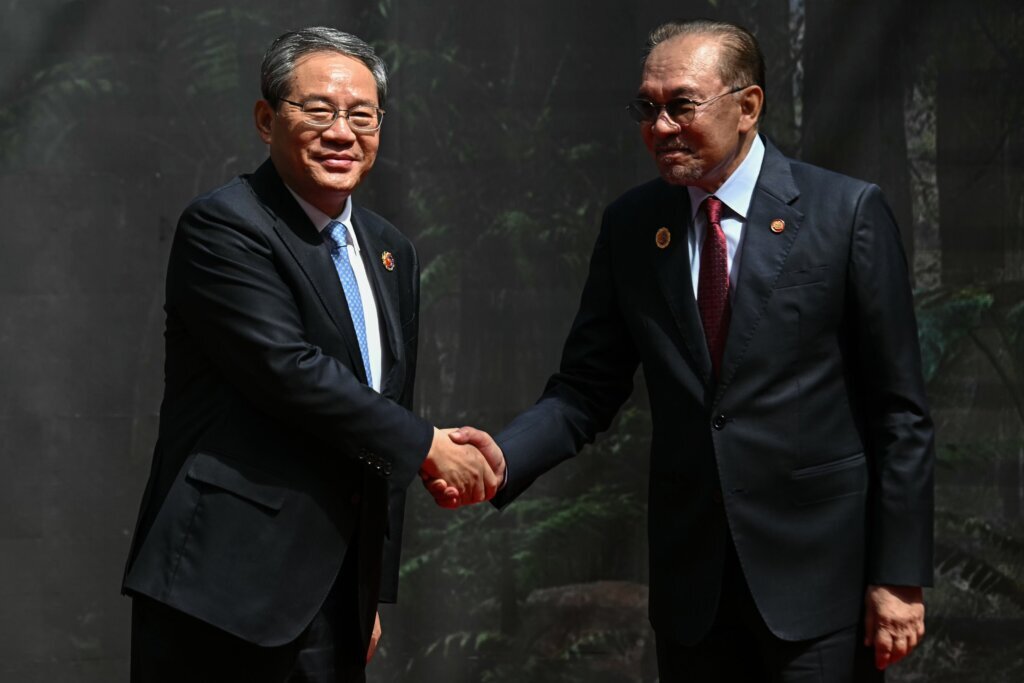**Anwar Ibrahim Urges Asia-Pacific Leaders to Favor Dialogue Over Confrontation at East Asia Summit**
*KUALA LUMPUR, Malaysia (AP)* — Malaysian Prime Minister Anwar Ibrahim on Monday called on Asia-Pacific leaders to choose dialogue over coercion and cooperation over confrontation during the opening of the East Asia Summit. His remarks came amid increasing rivalry between the United States and China in the region.
The East Asia Summit serves as a regional forum, bringing together the Association of Southeast Asian Nations (ASEAN) and key regional partners including Australia, China, India, Japan, New Zealand, South Korea, Russia, and the United States. The summit focuses on addressing political, security, and economic challenges.
“Today we must renew our shared purpose, reassert our objectives, promote principles of forward-looking engagement,” Anwar said in his opening speech. “We continue to advocate for dialogue over coercion, and cooperation over confrontation. We affirm our stand on global peace and security, for multilateralism and international law.”
The summit was held shortly after U.S. President Donald Trump departed Malaysia on Monday for Japan, following his participation in ASEAN’s weekend summit meetings. On Sunday, Trump witnessed the signing of several economic agreements with Malaysia, Thailand, and Cambodia as part of Washington’s initiative to strengthen trade ties and secure access to critical minerals, aiming to reduce reliance on China.
Trump also attended a ceremony marking the formal expansion of the Cambodia-Thailand ceasefire, an agreement brokered earlier this year with U.S. assistance.
### Key Issues on the Agenda
Analysts say the main topics dominating discussions at the East Asia Summit will include tensions in the South China Sea, the resilience of regional supply chains, and ASEAN’s response to internal crises, notably Myanmar’s prolonged conflict.
The U.S. delegation is expected to emphasize freedom of navigation, economic security, and a transactional approach to alliances and trade. According to Ilango Karuppannan, former Malaysian ambassador and senior adjunct fellow at Singapore’s S. Rajaratnam School of International Studies, the U.S. aims to position itself as a reliable partner for Indo-Pacific stability.
In contrast, China, represented by Premier Li Qiang, is likely to stress sovereignty, noninterference, and the benefits of connectivity through initiatives such as the Belt and Road Initiative and other regional frameworks.
“Their rivalry sets the backdrop against which every other issue is discussed—from security to trade,” said Ilango. However, ASEAN is expected to maintain neutrality, focusing on regional cooperation rather than choosing sides.
“The 20th East Asia Summit will be remembered for the signing of the peace deal and the U.S. trade recalibration with Southeast Asia,” he added.
### Calls for Peace and Engagement
In his speech, Anwar praised President Trump’s plan to end the Gaza conflict but insisted that more efforts are necessary to achieve a just and lasting political solution for the Palestinian people.
He expressed concern over the recent surge in ballistic missile launches by North Korea and urged for continued engagement.
“Once we call for engagement in all areas—from Gaza to Ukraine to Myanmar—we should not preclude engagement with North Korea,” Anwar said.
Regarding Myanmar, he reiterated ASEAN’s commitment to its 2021 Five-Point Consensus, which advocates peace and dialogue to resolve the civil war triggered by Myanmar’s 2021 military takeover. Although he did not comment on Myanmar’s upcoming general election plans, he noted that fighting has subsided and emphasized the importance of ongoing engagement.
Anwar also addressed territorial disputes in the South China Sea, stating they should be resolved among ASEAN members and regional partners through a “Code of Conduct” currently under negotiation. He warned that outside pressure could exacerbate tensions and called on all parties to respect international law.
### Regional Economic Commitments
Earlier, ASEAN members along with five partners—China, Japan, South Korea, Australia, and New Zealand—held a leaders’ summit of the Regional Comprehensive Economic Partnership (RCEP), the first since the free trade pact was signed in 2020.
Covering roughly one-third of global GDP, the RCEP aims to promote regional economic integration and strengthen supply chain resilience.
In a joint statement, RCEP leaders emphasized that their partnership could enhance the region’s economic resilience amid global uncertainties. They reaffirmed commitment to multilateralism and pledged to boost implementation of the RCEP agreement alongside domestic reforms.
Economist Doris Liew, specializing in Southeast Asian development, described RCEP as “a practical hedge against U.S. tariff shocks.” While acknowledging that RCEP’s provisions are relatively loose compared to other trade blocs, she noted that the partnership helps diversify trade baskets and reduces exposure to unilateral U.S. actions.
—
*This article highlights the diplomatic efforts and regional cooperation initiatives unfolding at the 20th East Asia Summit against the backdrop of shifting geopolitical dynamics in the Asia-Pacific region.*
https://wtop.com/world/2025/10/malaysias-anwar-calls-for-dialogue-over-coercion-at-aseans-east-asia-summit/

